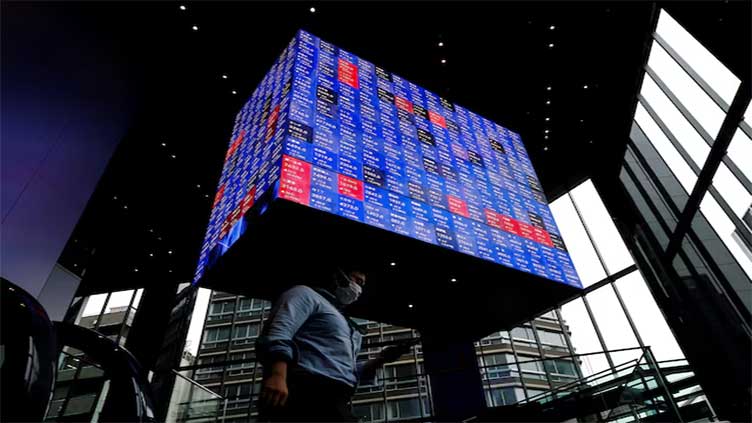Asia shares set for solid monthly gain, dollar slumps

Business
MSCI's broadest index of Asia-Pacific shares outside Japan was set for a gain of 2.3% for the month
SINGAPORE (Reuters) – Asian stocks rose on Friday and were poised for a solid end to August, while the dollar was staring at its worst monthly performance in nine months on the view that the Federal Reserve is all but certain to cut interest rates next month.
The release of the US core personal consumption expenditures (PCE) price index, the Fed's preferred measure of inflation, as well as a reading on euro zone inflation take centre stage later on Friday and are likely to offer further clues on the rate outlook across major economies.
MSCI's (Morgan Stanley Capital International) broadest index of Asia-Pacific shares outside Japan was last up 0.77%, and was set for a gain of 2.3% for the month.
US stock futures extended Wall Street's positive run, with Nasdaq futures rising 0.36% and S&P futures advancing 0.2%.
EUROSTOXX 50 futures were off 0.22%, while FTSE futures gained 0.4%.
Solid growth and resilience in the world's largest economy trumped investors' disappointment over Nvidia’s underwhelming results, which had sent global technology stocks falling.
Taiwan's benchmark index and South Korea's KOSPI, both tech-heavy indexes, recovered from Thursday's losses to trade 0.44% and 0.7% higher, respectively.
"The US data overnight undercut recession fears further," said Alvin Tan, head of Asia FX strategy at RBC Capital Markets, referring to the second-quarter GDP growth revision and weekly jobless claims data.
Financial markets had a turbulent run in August, after a slew of weaker-than-expected US economic data early in the month sparked fears of an impending recession, forcing investors to dump risky assets in search of safety.
The volatility was further exacerbated by the unwinding of yen-funded carry trades in the wake of the Bank of Japan's (BOJ) unexpected rate hike, leading to a massive sell-off in global stocks on Aug. 5 that was reminiscent of the October 1987's "Black Monday".
Japan's Nikkei has since recovered from its early month collapse, though the index was still set to lose 1.6% for the month. It was last up 0.3% on Friday.
Data on Friday showed core consumer prices in Japan's capital accelerated for a fourth straight month, keeping alive market expectations of further BOJ rate hikes in coming months.
Elsewhere, Chinese shares jumped on Friday from near seven-month lows, with property stocks in particular making solid gains.
The CSI 300 Real Estate index of shares surged more than 8%, while Hong Kong's Hang Seng Mainland Properties Index was up 7%.
Bloomberg News reported on Friday that China is considering allowing homeowners to refinance as much as $5.4 trillion in mortgages to lower borrowing costs for millions of families and boost consumption.
"There hasn't been much news over the last few weeks on the property front, so people are excited... I'm still sceptical that this will really encourage a lot of home buyers," said Steven Leung, executive director of institutional sales at brokerage UOB Kay Hian in Hong Kong.
EASING CYCLE
The main focus for investors remains on the pace and scale of Fed rate cuts this year, with those bets further cemented after a chorus of Fed speakers signalled their intention to do so as early as next month.
Markets have priced in about 100 basis points (bps) worth of easing by the end of the year, with about a 32.5% chance of an outsized 50 bps cut in September.
That's left the dollar struggling as it eyed its sharpest monthly decline since November on Friday.
Against the yen, the greenback last stood at 144.79 and was set to lose more than 3% for the month, as pressure eases on the Japanese currency on the prospect of narrowing interest rate differentials.
The euro fell 0.02% to $1.1075, having declined 0.38% in the previous session after lower-than-expected German inflation data added to bets of further European Central Bank (ECB) rate cuts.
"Germany's obviously quite a big weight within the euro zone, so if we get a downside surprise on Germany, it can feed through into the bigger numbers," said Rob Carnell, ING's regional head of research for Asia-Pacific.
"The ECB have been a bit sort of humming and harring about a September cut, and whether or not there'll be more after that. It does make it look more likely."
In commodities, oil prices edged slightly higher, with Brent crude futures rising 0.3% to $80.18 a barrel, while US West Texas Intermediate crude futures gained 0.26% to $76.11 per barrel.
Spot gold fell 0.28% to $2,514.12 an ounce, though was set for a 2.6% gain for the month, helped by the prospect of an imminent Fed easing cycle and a weaker dollar.


